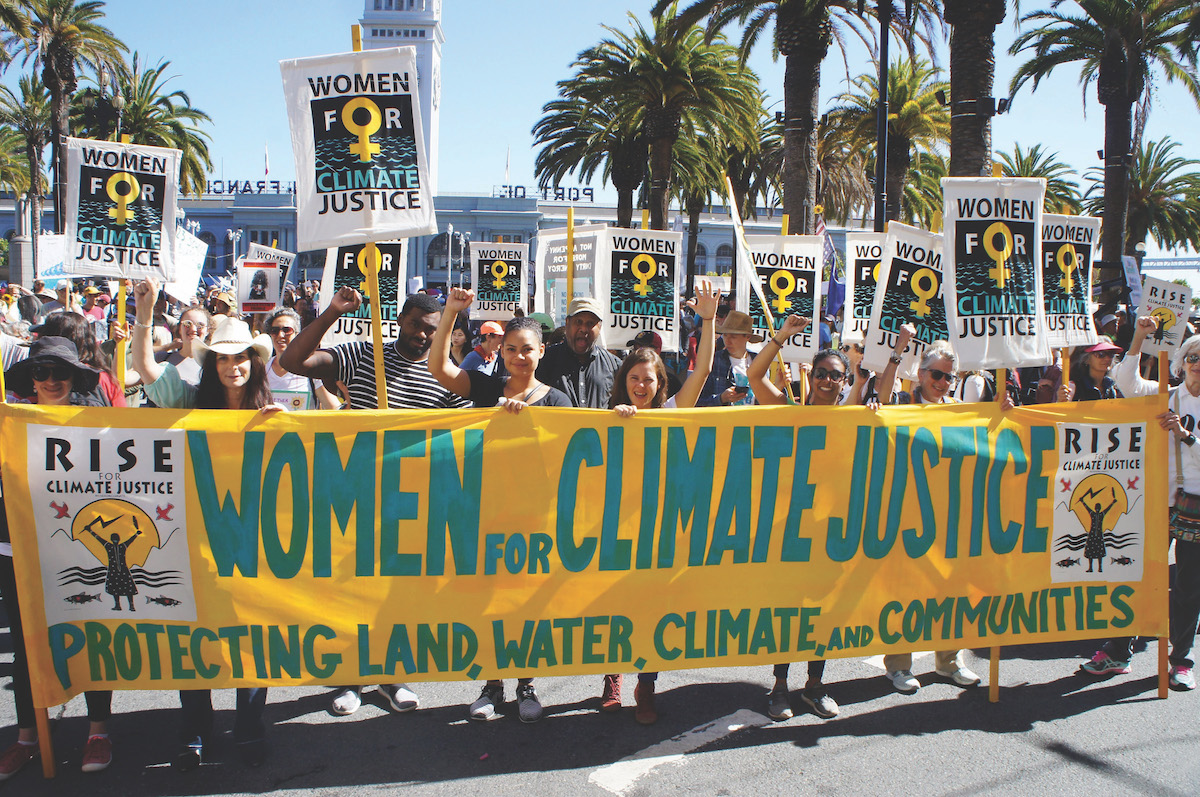An International Ecosystem of Climate Action

The image made headlines around the world: five Indigenous women in traditional regalia standing outside the imposing facade of a European bank. It was 2017, and the Indigenous Women’s Divestment Delegation had formulated because of the Dakota Access Pipeline protest at Standing Rock. Sitting at conference tables, these women faced down Norwegian, German, and Swiss bankers, and told stories of their fight to protect water and experiences of law enforcement abuse. Citing international human rights law, they made a straightforward request: Stop financing the destruction of their land.
“Women were able to look decision-makers directly in the eye and tell their stories of harm to their lives, bodies, and homelands,” says Osprey Orielle Lake, founder and executive director of Women’s Earth and Climate Action Network (WECAN), who co-coordinated these meetings with Divest Invest Protect leadership. Collective pressure worked: Hundreds of millions of dollars were divested from the project. Since its inception, WECAN has facilitated various types of delegations of frontline women worldwide to stop fossil fuel expansion and deforestation.
WECAN’s programs reach more than 50 countries, uniting women in the fight for social and climate justice. From reforestation projects in the Congo and Amazon rainforests to the protection of nine million acres of old-growth forest in Alaska, from fossil fuel divestment to United Nations climate policy advocacy, from Indigenous rights to food sovereignty projects, WECAN gets behind women on the frontlines tackling the root causes of environmental degradation and socioeconomic inequalities.
“We need to have Indigenous, Black, and Brown women, in the room, directly engaging with government leaders and financial institutions. Communities being impacted must be heard,” Lake says. “Simultaneously, while we are working to stop destructive projects, we need to be building the healthy and equitable world we know is possible.”
Taken by Storm
Women’s leadership can, quite literally, change the climate. So demonstrated the more than 1,000 women of the WECAN Women for Forests program in the Democratic Republic of Congo, who have planted more than 300,000 trees in the Itombwe Rainforest. There, women carry native saplings on their heads, strategically planting them to yield a 94.7% survival rate. These carbon-sequestering trees have influenced the local climate, lowering temperatures and bringing rain to parched landscapes. The reforestation effort has also increased available habitat for gorillas, golden cats, and rare birds. And women responsible are emerging as newly respected leaders of their communities.
“Study after study demonstrates that investing in women and girls is a solution to the climate crisis and that we cannot achieve thriving communities without women’s leadership,” Lake says.
But WECAN faces a major challenge. Research shows that women and Indigenous peoples are key to protecting biodiversity and ensuring food security and water supplies. Yet philanthropic investors too often regard women-centered organizations as niche rather than essential to climate solutions.
“WECAN works to reframe and redirect the narrative on climate change to ensure that women’s successful work in the fields, forests, streets, universities, and halls of power are made central to the climate discussion,” Lake says. “We are never giving up. We are fighting for our communities and our beautiful planet.”
Women’s Earth and Climate Action Network
Donate now!wecaninternational.org
(415) 722-2083
Secretary-Treasurer: Wyolah Garden
Mission
The Women’s Earth and Climate Action Network (WECAN) International is a solutions-based organization established to engage women worldwide in policy advocacy, on-the-ground projects, trainings, and movement building for global climate justice.
Begin to Build a Relationship
We know you care about where your money goes and how it is used. Connect with this organization’s leadership in order to begin to build this important relationship. Your email will be sent directly to this organization’s director of development and/or Executive Director.